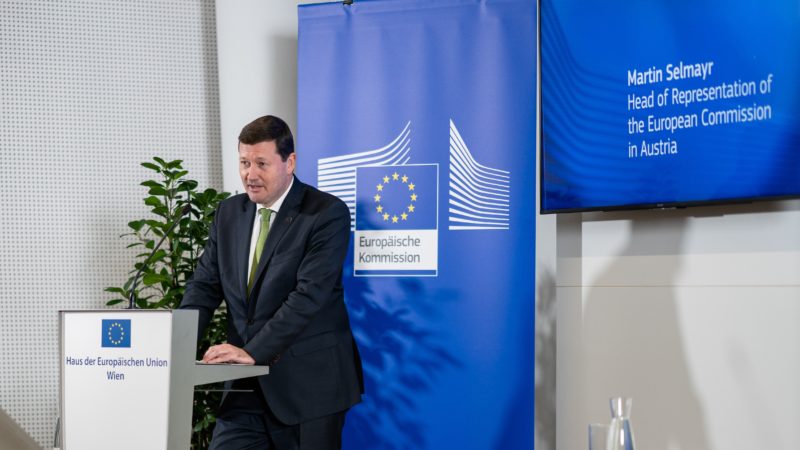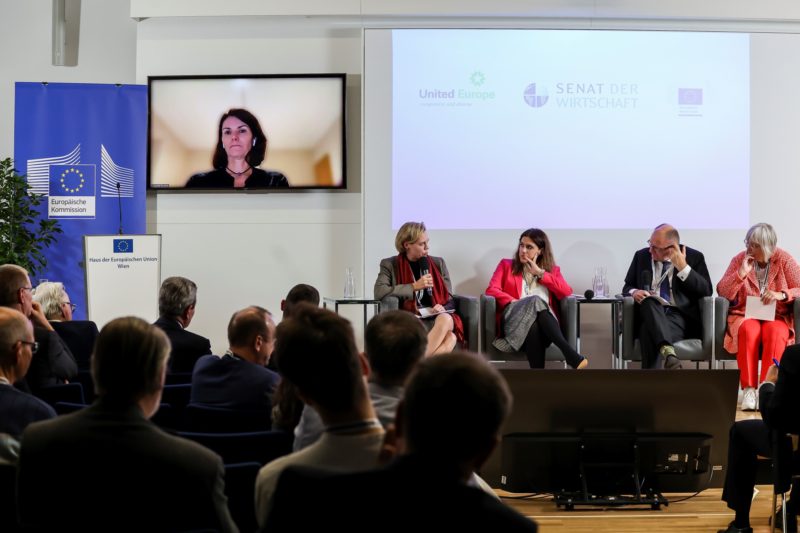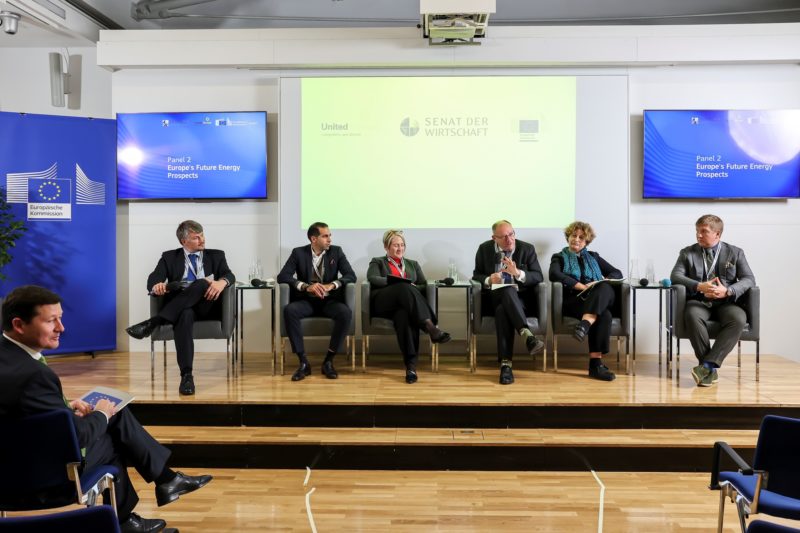On November 3, United Europe’s Energy Security Summit in partnership with the Representation of the European Commission in Austria and the Senat der Wirtschaft Österreich took place in the House of the European Union. Historically, Vienna has always been an energy hub and United Europe was delighted to be hosted by Prof. Dr Martin Selmayr, Head of Representation at the European Commission in Austria.

Martin Selmayr highlighted in his keynote speech Europe’s priorities in the current energy crisis and concluded with recommendations: Pooling and filling up storages for next winters through joint purchasing and a European Purchasing Consortium as well as the continuation of energy savings and solidarity among member states. He cautioned that never again Europe must allow borders to be moved by force: “If this happens our continent would be in bloodshed. It is not a small detail. It is the essence of peace on our continent.” he said. “Never again must the rule of the stronger replace the strength of the rule of law. Never again must Europe sit idle and not counter aggression.”
Günther H. Oettinger, President of United Europe, continued with a welcome speech and underlined that the energy crisis, resulting from Russia’s war against Ukraine, requires a “Europeanization” of energy policy and an overcoming of national egoisms: “Energy policy must be Europeanized. All hands on deck, 27 members, the Western Balkans and neighbours, all have to become an energy team.” This means co-funded infrastructure, electricity transported through super grids throughout Europe and joint European research in predominately efficiency and storage technologies.
The first panel of the Energy Security Summit discussed how Europe became so dependent on Russian gas and what Europe should do now. The panel with Mechthild Wörsdörfer, Deputy Director General for Energy at the European Commission, Annika Brack, Head of EU Representative Office at Uniper, Monika Köppl-Turyna, Director at ECO Austria and Angela Köppl, Senior Economist at WIFO, made the following conclusions:

For Mechthild Wörsdörfer at the European Commission, it is clear, that Europe faces an unprecedented crisis: “We have changed in speed to react to the crisis and to help come out of the crisis with measures tackling the short- but also the long-term.” In the past 20 years, the European Commission has been working on an internal energy market. The infrastructure for it is in place and some member states are in a better position than others. The European Green Deal has helped to speed up the development of alternative energy sources. Wörsdorfer acknowledged that still more has to be done: “The supply of LNG gas requires long-term contracts and here we cannot lose sight of our long-term goals to reduce emissions and replace fossil fuels with renewables, for example, green hydrogen. We have to make the bridge to the future and at this point, we cannot commit to long-term supply contracts.” The European Commission is working at full speed on structural changes. Whilst most of the attention is on short-term crisis management, the European Commission is fully committed to the long-term goals, Wörsdörfer concluded.
Annika Brack acknowledged that Uniper, which has been a major client of Gazprom, incurred huge losses due to the crisis: “We have seen a reliable partnership for years and this crisis has simply not been in our books.” Brack commended the European Commission’s efforts to transform Europe’s energy markets in order to get out of this crisis: “I hope that we will keep this accelerated pace by continuously removing regulatory roadblocks. The industry has many solutions ready to come out of the crisis. We are just waiting for roadblocks to be taken out of the way,” Brack concluded.
For Monika Köppl-Turyna this crisis has been an “I told you so” moment: “The European Union needs to wake up and be careful not to replace one dependency with another. We need to build more strategic sovereignty through joint procurement even beyond the European market.” The LNG market is global and Köppl-Turyna recommends going bold and building partnerships with the rest of the world. Europe needs to keep key sovereignty in technology in European hands to prevent past mistakes made with for example solar panels: “With the IPCEI Program, which is commonly known as Important Projects of Common European Interest, Europe offers a great tool. Europe needs to build strategic partnerships across the Atlantic with our liberal partners to counterbalance monopolies.” In Europe, it is well understood that the division of labour and the division of tasks makes economic sense. Comparative advantage can be in labour but also in the production of energy: “We need grids and infrastructure on a European level. It would be an immense economic benefit to europeanize energy,” Köppl-Turyna concluded.

On the second panel, Tim Joris Kaiser, Advisor at the Representation of the European Commission in Austria, Stephan Sharma, Chairman of the Board at Burgenland Energy, Christine Materazzi-Wagner, Director Electricity E-Control, Valerie Faudon, Director General at European Nuclear Society and Andriy Kobolyev, former CEO at Naftogaz, made the following observations on Europe’s Future Energy Prospects.
Tim Joris Kaiser said that diversification is one of the most important aspects in the short-term whilst energy saving is one of Europe’s priorities in the long term. The two big themes for the future are energy efficiency and renewables and business has to contribute through innovation. Kaiser cautioned that beyond fossil fuels demand for rare earth will increase by 5 fold. The European Commission is already taking measures to avoid running into the next dependency through new partnerships and trade agreements. The European Union is increasing trade with India and is putting lots of effort into the so-called friend-shoring (partnerships with like-minded countries). The commission is driving initiatives such as the Battery Alliance and the Chips Act as well as the Critical Raw Materials Act. A new European Sovereign Act is on the horizon to shape industrial policy. The Recovery and Resilience plans are now going to be extended through RePower EU, pushing e-mobility and energy saving as well as supporting business. RePower EU is not only about energy but also about global competitiveness and sovereignty: “Geopolitics is here to stay. It is not comfortable for the business of politics, but it is what we will have to deal with in today’s reality,” Kaiser concluded.
Stephan Sharma, Chairman of the Board at Burgenland Energy, underlined the dependence on energy in the current economic system: “Energy is key. Regions that provide cheap and sustainable energy will be the winners.” Sharma warned about the obvious climate crisis in Europe: this year alone, 600ha of forests were burning and lakes across the continent are drying out. Currently, the economic system in Europe depends on the availability of cheap fossil fuels. Sharma compared this dependency with an addiction to drugs: ”What is the drug dealer doing, when he sees the buyer is locked in? He is increasing the price and he is playing with uncertainties.” For Sharma there is a clear way out: 100% renewables and zero emissions: “Can Europe do it? Yes! We have hydro, we have wind and we have sun. We also have the technology.” Sharma however cautioned that Europe should be wary about the dependencies on China: “We currently depend 80% on China for solar panels. Only 10 years ago, Germany built 90% of all solar panels. We have to bring it back to Europe. We need a shift in our economy and rebuild the system.”

Christine Materazzi-Wagner, Director Electricity at E-Control, focused her observations on the electricity markets and systems based on different energy sources and various regions around Europe: “In the European Union, you can link all these electricity-generating networks together. We need the generation of power but we also need the high-efficient grids and network development. We have to work on the market design now to be fit for our 2030, 2040 and 2050 programs. Whatever we design now needs implementation time.” Renewables are quite different from legacy energy sources i.e. photovoltaics are small when installed on rooftops and huge as green field photovoltaics. There is solar, thermal, mirror systems, wind turbines in various sizes, hydro, biomass, ocean technologies etc. There are differences on various levels, between but also within the categories and all of which have to be integrated into the electricity system: “It also gets tricky with the forecast of wind and solar power. They are weather /climate dependent and unpredictable,” Europe needs more experts for implementation, the permitting needs to be accelerated and the grid connection improved. “Europe needs the technologies, the market as well as institutional and legal frameworks. In the energy transformation all of the above is intertwined,” Materazzi-Wagner concluded.
Valerie Faudon, Director General at the European Nuclear Society, urged not to lose sight of the net zero goals by 2050, a long-term goal to be aligned with the short-term measures. Faudon underlined that Energy independence is a priority. France depends up to 60% on fossil fuels: “It is a huge challenge to replace that amount of power with renewables alone. To reach the climate goals, low-carbon electricity is needed.” The national plan in France is to reduce energy consumption by 40% through electrification: “Until today only two countries in Europe have decarbonized electricity consumption: Sweden and France. This was possible through a mix of nuclear and renewables. A 100% renewables is very risky. It is challenging to deploy that amount of renewables to meet our power needs in Europe.”
Faudon cautioned that it is still unclear if the storage at the scale needed will be available through renewables: “If we are losing the bet here, the only solution to cover our energy needs is to go back to fossil fuels. We create new dependencies on raw materials and on imports of renewable hydrogen from countries, that have no electricity for their own population.” Faudon concluded that nuclear is a low-carbon solution with the capacity to meet Europe’s energy demands and urged to look at the total system costs of the other options.
Andriy Kobolyev, former CEO at Naftogaz, finds that the energy discussion in Europe lacks pragmatism: “We talked about the concept of sovereignty, comparative competition and competitive advantage. Pragmatism, to my surprise, was not mentioned.” Kobolyev reminded the audience that Gazprom has not been a reliable supplier due to the gas price hike in 2021 before the war started: “Some people simply chose a convenient position and turned a blind eye.” With Russian gas leaving Europe, the current crisis creates a unique momentum for the European Green Deal: “We are still not seeing the pragmatism: Looking at the numbers, it is clear that renewables will not meet the targets of zero-emission. Forgetting about nuclear is a huge mistake.” Kobolyev said. “The war in Ukraine has proven how resilient nuclear energy is. Power plants were under constant attack and are still operating safely. Nord Stream 2 on the contrary is in a very different situation. This is a pragmatic takeaway to be taken further in Europe’s strategic thinking,” Kobolyev concluded.
We would like to thank Prof. Dr Selmayr, Head of Representation of the European Commission in Vienna, the team of the Representation of the European Commission in Vienna and the Senat der Wirtschaft Österreich, participants, guests on-site and online especially our members who have made this event possible. Over 100 guests were listening on-site and online who have been invited from all across Europe. Alan Riley moderated our panel discussions.



